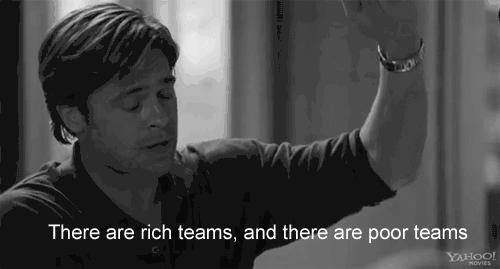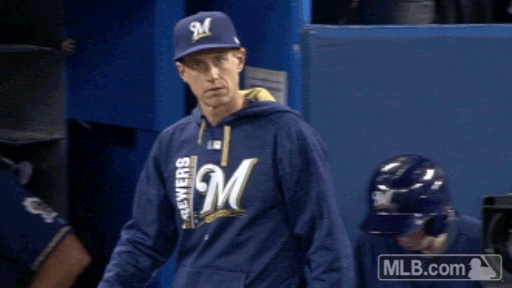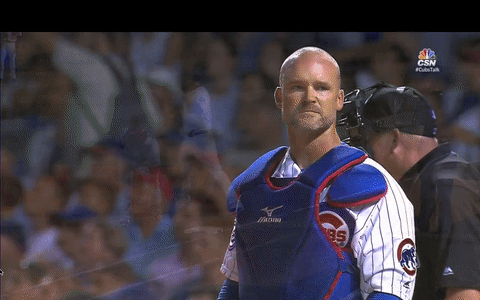
Before your blood pressure rises to unhealthy, stroke-inducing levels, take a deep breath--this post has nothing to do with politics. That part of the Ricketts persona is off limits in this piece, so we're going to just ignore that going forward and do that "stick to sports" thing. What I will do, however, is give this entire take the following disclaimer:

I firmly believe that all MLB teams can afford to spend more. Yes, I'm looking at you, A's, Rays and Marlins. Moneyball is fine and all, but when you consistently trade away great players just as they reach peak value, disappoint your fan base and refuse to put your revenues back on the field in a meaningful way, it becomes a huge problem. All teams are owned by some configuration of billionaires, and should be giving their fans' investment in them back in the form of trying to be competitive. I don't want this post to read as "pro-owner," because that's not my intent.
Now onto the task at hand. At some point soon after the disappointing end of the 2018 season, Theo Epstein held a somber press conference where he talked about a "reckoning." "Talent over production." "No excuses." It was grim. It sounded like a retooling of the roster was in the offing. Maybe some major free agent signings were on the horizon. Soon after, though, we first heard a talking point from Theo Epstein that would become a major bone of contention with fans throughout the winter: The Budget. I'm not going to rehash The Budget here, because chances are you read it on 15 different blogs, 10 different local news sites, and 6 different national media outlets a day before a pitch was ever thrown in spring training, and are still exhausted from it. The Cubs would be certainly be exceeding the first competitive balance tax threshold for 2019, but it seemed Cheap Ricketts had artificially limited Thed from going any further than that, effectively taking them out of the running for the biggest free agents on the market in Bryce Harper and Manny Machado with his only explanation being that there wasn't any more money left. Many also criticized the move as preventing the Front Office from filling the biggest needs for the team--a back-end bullpen arm to fill in for the unreliable Brandon Morrow and a high OBP, high contact lead-off hitter. "Cheap Ricketts being cheap!" the fans cried. "What about the new television deal?" everyone wondered, as we would have to wait until nearly the end of the 2019 season to see the Marquee Network picture come into focus.
And already here in the 2019/20 offseason, we're hearing Ricketts talk about it again, with fans having strong reactions.

What if, however, The Budget wasn't Ricketts being cheap at all? After all, the Cubs would ultimately end up with the second highest payroll in baseball behind the Boston Red Sox, breezing past the first luxury tax line and bumping up against the second. Ownership would loosen the purse strings and approve a mid-season, 3-year signing of closer Craig Kimbrel. What if The Budget was also a reckoning for Thed and the rest of the Front Office? In the years since the Thed regime have taken over management of baseball operations, we have seen some great successes, particularly prior to the 2016 World Series win: the signings of Jon Lester and Ben Zobrist, trades for Anthony Rizzo, Jake Arrieta, Pedro Strop, and Kyle Hendricks, and drafting Kris Bryant to name a few. I'm also not one to re-litigate the Gleyber Torres trade for Aroldis Chapman, because without a lock-down closer the Cubs don't have that shiny World Series trophy--and flags do fly forever. This FO has also developed Javy Baez and Willson Contreras into two of the most exciting, productive players in the game, and there's something to be said for that type of willingness to nurture young talent.

On the flip side, Thed have had their share of swings and misses since 2016, a fact which Epstein himself acknowledged after this year's disappointing finish. Under his leadership, the team has continued to fail at scouting and developing starting pitching, which means either doling out more money in free agent contracts to older, more established pitchers with more mileage on their arms or trying to squeeze value out of the depleted minor league system to find a diamond in the rough via trade. Since 2016 the Cubs have largely paid for pitching, and the price has been steep. Thed also have made big splashes in free agency for position players such as Jason Heyward that haven't always panned out. Heyward's contract hits the team for a $23M average annual value (AAV), which is their hit on the luxury tax threshold. He seems like a great guy, and speeches are great, and some people haven't given up on him, but that's... not worth the production he gives back. Add to that the extreme gamble they took on Brandon Morrow considering his checkered health past and disappointing 2018 seasons from both Yu Darvish and Tyler Chatwood, and you might understand why ownership would hesitate to keep making it rain for Thed's suddenly poor instincts after 2018. Perhaps it was unreasonable of us in hindsight to expect Cheap Ricketts to entrust a $300M+ contract signing to Thed based on their recent track record? After all, big contracts all eventually turn into older players that may not produce to their salary levels, and continued gambling on that type of production isn't exactly the way to build a sustainable winner.
I also think it's fair to comment on the relative lack of development of some of the Cubs' top draft picks since Thed have taken over. While Bryant is still the best player on this team, players like Albert Almora, Jr. and Ian Happ are struggling to reach their full potential, their development stalled in the last two seasons by some combination of coaching staff turnover and lineup malfeasance. We may never hear from Brendon Little again, and even Kyle Schwarber, who I'm a big fan of, just started to level up in the last half of 2019 when he was left in the middle of the line up and actually had offensive production comparable to Dodgers MVP candidate Cody Bellinger in the same span.
Ultimately, while I understand the pervasive frustration with The Budget, I can't help but think that perhaps the 2019 reckoning wasn't just for the players, but for Thed, their player development staff, and their free agent signing decisions as well. Perhaps The Budget was Cheap Ricketts' way of saying, "These are your guys--now you need to make it work." We've already seen moves being made to alter the development area of the club with Jason McLeod's lateral demotion from Senior VP of Amateur Scouting and Player Development to Senior VP of Player Personnel and a number of shake-ups within the development staff. The Cubs also attempted to hire Driveline Baseball founder Kyle Boddy for an unspecified role before he was stolen away by the Reds, which many read as an acknowledgement of the need to develop better pitching internally. In addition, President of Elite Baseball Training Justin Stone, who had been contracting with the Cubs, was hired for the organization's Director of Hitting post.

I expect to see plenty of roster shake-ups this offseason, perhaps even one or two significant trades to bring in a few bats that make more consistent contact. If those changes play out, it will truly be the reckoning we needed to see last year--perhaps now Thed have finally gotten The Budget memo. Heck, we might even see Cheap Ricketts loosen up the purse strings a little more this winter to give his shiny new manager some extra toys to play with. It's not like most smart owners are going to go out crowing about how much stupid money they're going to spend, as Matt pointed out to me, so even if he doesn't say it, it doesn't mean it won't happen. Let's just say it wouldn't surprise me.